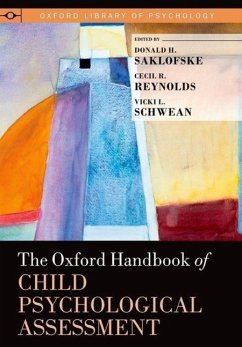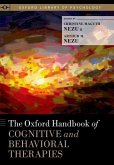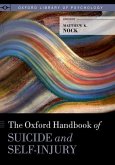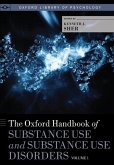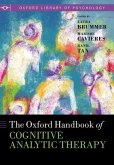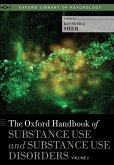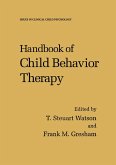Oxford Handbook of Child Psychological Assessment
Herausgeber: Saklofske, Donald H; Reynolds, Cecil R; Schwean, Vicki L
Oxford Handbook of Child Psychological Assessment
Herausgeber: Saklofske, Donald H; Reynolds, Cecil R; Schwean, Vicki L
- Gebundenes Buch
- Merkliste
- Auf die Merkliste
- Bewerten Bewerten
- Teilen
- Produkt teilen
- Produkterinnerung
- Produkterinnerung
This handbook surveys clinical and educational considerations related to the foundations, models, special topics, and practice of psychological assessment.
Andere Kunden interessierten sich auch für
![The Oxford Handbook of Cognitive and Behavioral Therapies The Oxford Handbook of Cognitive and Behavioral Therapies]() The Oxford Handbook of Cognitive and Behavioral Therapies251,99 €
The Oxford Handbook of Cognitive and Behavioral Therapies251,99 €![Oxford Handbook of Suicide and Self-Injury Oxford Handbook of Suicide and Self-Injury]() Oxford Handbook of Suicide and Self-Injury265,99 €
Oxford Handbook of Suicide and Self-Injury265,99 €![The Oxford Handbook of Feminist Multicultural Counseling Psychology The Oxford Handbook of Feminist Multicultural Counseling Psychology]() The Oxford Handbook of Feminist Multicultural Counseling Psychology286,99 €
The Oxford Handbook of Feminist Multicultural Counseling Psychology286,99 €![The Oxford Handbook of Substance Use and Substance Use Disorders The Oxford Handbook of Substance Use and Substance Use Disorders]() The Oxford Handbook of Substance Use and Substance Use Disorders251,99 €
The Oxford Handbook of Substance Use and Substance Use Disorders251,99 €![The Oxford Handbook of Cognitive Analytic Therapy The Oxford Handbook of Cognitive Analytic Therapy]() Laura BrummerThe Oxford Handbook of Cognitive Analytic Therapy193,99 €
Laura BrummerThe Oxford Handbook of Cognitive Analytic Therapy193,99 €![The Oxford Handbook of Substance Use and Substance Use Disorders The Oxford Handbook of Substance Use and Substance Use Disorders]() The Oxford Handbook of Substance Use and Substance Use Disorders251,99 €
The Oxford Handbook of Substance Use and Substance Use Disorders251,99 €![Handbook of Child Behavior Therapy Handbook of Child Behavior Therapy]() WatsonHandbook of Child Behavior Therapy241,99 €
WatsonHandbook of Child Behavior Therapy241,99 €-
-
-
This handbook surveys clinical and educational considerations related to the foundations, models, special topics, and practice of psychological assessment.
Hinweis: Dieser Artikel kann nur an eine deutsche Lieferadresse ausgeliefert werden.
Hinweis: Dieser Artikel kann nur an eine deutsche Lieferadresse ausgeliefert werden.
Produktdetails
- Produktdetails
- Verlag: Oxford University Press
- Seitenzahl: 896
- Erscheinungstermin: 17. April 2013
- Englisch
- Abmessung: 266mm x 184mm x 50mm
- Gewicht: 1689g
- ISBN-13: 9780199796304
- ISBN-10: 0199796300
- Artikelnr.: 36694514
- Herstellerkennzeichnung
- Libri GmbH
- Europaallee 1
- 36244 Bad Hersfeld
- gpsr@libri.de
- Verlag: Oxford University Press
- Seitenzahl: 896
- Erscheinungstermin: 17. April 2013
- Englisch
- Abmessung: 266mm x 184mm x 50mm
- Gewicht: 1689g
- ISBN-13: 9780199796304
- ISBN-10: 0199796300
- Artikelnr.: 36694514
- Herstellerkennzeichnung
- Libri GmbH
- Europaallee 1
- 36244 Bad Hersfeld
- gpsr@libri.de
Donald H. Saklofske,, is Professor, Division of Applied Psychology, University of Calgary. Vicki L. Schwean,, is Vice Dean, Faculty of Education, University of Calgary. Cecil R. Reynolds, Ph.D., is Professor Emeritus of Educational Psychology and Neuroscience, and Distinguished Research Scholar, Texas A & M University.
* Preface
* Donald H. Saklofske, Cecil R. Reynolds, and Vicki L. Schwean
* Part One: Foundations of Psychological Assessment
* 1. The Role of Theory in Psychological Assessment
* Darielle Greenberg, Elizabeth O. Lichtenberger, and Alan S. Kaufman
* 2. Testing: The Measurement and Assessment Link
* Scott L. Decker
* 3. Measurement and Statistical Issues in Child Assessment Research
* Matthew R. Reynolds and Timothy Z. Keith
* 4. Psychometric Versus Actuarial Interpretation of Intelligence and
Related Aptitude Batteries
* Gary L. Canivez
* 5. The Status of Projective Assessment in Psychological Science and
in Practice
* Hedwig Teglasi
* 6. Large-Scale Group Score Assessments: Past, Present, and Future
* Bobby Naemi, Eugene Gonzalez, Jonas Bertling, Anthony Betancourt,
Jeremy Burrus, Patrick C. Kyllonen, Jennifer Minsky, Petra Lietz,
Eckhard Klieme, Svenja Vieluf, Jihyun Lee, and Richard D. Roberts
* 7. Testing, Assessment, and Cultural Variation: Challenges in
Evaluating Knowledge Claims
* Craig L. Frisby
* 8. Methods for Translating and Adapting Tests to Increase
Cross-Language Validity
* Ronald K. Hambleton and Minji Kang Lee
* 9. Diagnosis, Classification, and Screening Systems
* R. W. Kamphaus, Erin Dowdy, Sangwon Kim, and Jenna Chin
* 10. The ICF-CY: A Universal Taxonomy for Psychological Assessment
* Rune J. Simeonsson and Andrea Lee
* 11. Responsible Use of Psychological Tests: Ethical and Professional
Practice Concerns
* Jonathan W. Gould, David A. Martindale, and James R. Flens
* Part Two: Models of Assessment
* 12. Cognitive Assessment: Progress in Psychometric Theories of
Intelligence, the Structure of Cognitive Ability Tests, and
Interpretive Approaches to Cognitive Test Performance
* Dawn P. Flanagan, Vincent C. Alfonso, Samuel O. Ortiz, and Agnieszka
M. Dynda
* 13. Principles of Assessment of Aptitude and Achievement
* W.J. Schneider
* 14. Principles of Neuropsychological Assessment in Children and
Adolescents
* Cynthia A. Riccio and Cecil R. Reynolds
* 15. Models for the Personality Assessment of Children and Adolescents
* Donald H. Saklofske, Diana K. Joyce, Michael L. Sulkowski, and Emma
A. Climie
* 16. Principles of Behavioral Assessment
* Tanya L. Eckert and Benjamin J. Lovett
* 17. Therapeutic Assessment with Adolescents and Their Parents: A
Comprehensive Model
* Deborah J. Tharinger, Lauren B. Gentry, and Stephen E. Finn
* Part Three: The Practice of Psychological Assessment
* 18. History-taking, Clinical Interviewing, and the Mental Status
Examination in Child Assessment
* Mauricio A. Garcia-Barrera and William R. Moore
* 19. Psychological Testing by Models of Cognitive Ability
* A. Lynne Beal, John O. Willis, and Ron Dumont
* 20. Methods of Neuropsychological Assessment
* Susan Homack
* 21. Memory Assessment
* Wayne Adams
* 22. Formal Methods in Assessing Child and Adolescent Personality and
Affect
* Patricia A. Lowe, Erik L. Fister, Susan M. Unruh, Jennifer M. Raad,
Justin P. Allen, Tiffany L. Arrington, Skylar A. Bellinger, Liesl J.
Edwards, Belinda N. Kathurima, Jeaveen M. Neaderhiser, Christopher R.
Niileksela, Jessica Oeth Schuttler, Matthew J. Grumbein, and Stephen
W. Loke
* 23. Methods of Assessing Academic Achievement
* Michelle A. Drefs, Tanya Beran, and Meghann Fior
* 24. Methods of Assessing Learning and Study Strategies
* Kathy C. Stroud
* 25. Models and Methods of Assessing Creativity
* James C. Kaufman, Christina M. Russell, and Jonathan A. Plucker
* 26. Methods of Assessing Behavior I: Observations and Rating Scales
* Erin Dowdy, Jennifer Twyford, and Jill D. Sharkey
* 27. Models and Methods of Assessing Adaptive Behavior
* Jason Hangauer, Jonathan Worcester, and Kathleen Hague Armstrong
* Part Four: Special and Emergent Topics in Child and Adolescent
Assessment
* 28. The Authentic Alternative for Assessment in Early Childhood
Intervention
* Marisa Macy and Stephen J. Bagnato
* 29. Assessing Mild Intellectual Disability: Issues and Best Practices
* Daniel J. Reschly
* 30. Toward a Synthesis of Cognitive-Psychological,
Medical/Neurobiological, and Educational Models for the Diagnosis and
Management of Dyslexia
* Nancy Mather, Bennett A. Shaywitz, and Sally E. Shaywitz
* 31. Testing Accommodations for Children with Disabilities
* Brian C. McKevitt, Stephen N. Elliott, and Ryan J. Kettler
* 32. Special Issues in Forensic Assessment of Children and Adolescents
* Kathryn Kuehnle, Steven N. Sparta, H.D. Kirkpatrick, and Monica
Epstein
* 33. Assessing Noncognitive Constructs in Education: A Review of
Traditional and Innovative Approaches
* Anastasiya A. Lipnevich, Carolyn MacCann, and Richard D. Roberts
* 34. Assessment of Subjective Well-being in Children and Adolescents
* E. Scott Huebner and Kimberly J. Hills
* 35. Assessment of Parenting Style, Parenting Relationships, and Other
Parent Variables in Child Assessment
* Laura G. McKee, Deborah J. Jones, Rex Forehand, and Jessica Cuellar
* 36. Linking Children and Adolescent Assessment to Effective
Instruction: An Evidence-based Perspective from the Experimental
Literature
* H. Lee Swanson
* Donald H. Saklofske, Cecil R. Reynolds, and Vicki L. Schwean
* Part One: Foundations of Psychological Assessment
* 1. The Role of Theory in Psychological Assessment
* Darielle Greenberg, Elizabeth O. Lichtenberger, and Alan S. Kaufman
* 2. Testing: The Measurement and Assessment Link
* Scott L. Decker
* 3. Measurement and Statistical Issues in Child Assessment Research
* Matthew R. Reynolds and Timothy Z. Keith
* 4. Psychometric Versus Actuarial Interpretation of Intelligence and
Related Aptitude Batteries
* Gary L. Canivez
* 5. The Status of Projective Assessment in Psychological Science and
in Practice
* Hedwig Teglasi
* 6. Large-Scale Group Score Assessments: Past, Present, and Future
* Bobby Naemi, Eugene Gonzalez, Jonas Bertling, Anthony Betancourt,
Jeremy Burrus, Patrick C. Kyllonen, Jennifer Minsky, Petra Lietz,
Eckhard Klieme, Svenja Vieluf, Jihyun Lee, and Richard D. Roberts
* 7. Testing, Assessment, and Cultural Variation: Challenges in
Evaluating Knowledge Claims
* Craig L. Frisby
* 8. Methods for Translating and Adapting Tests to Increase
Cross-Language Validity
* Ronald K. Hambleton and Minji Kang Lee
* 9. Diagnosis, Classification, and Screening Systems
* R. W. Kamphaus, Erin Dowdy, Sangwon Kim, and Jenna Chin
* 10. The ICF-CY: A Universal Taxonomy for Psychological Assessment
* Rune J. Simeonsson and Andrea Lee
* 11. Responsible Use of Psychological Tests: Ethical and Professional
Practice Concerns
* Jonathan W. Gould, David A. Martindale, and James R. Flens
* Part Two: Models of Assessment
* 12. Cognitive Assessment: Progress in Psychometric Theories of
Intelligence, the Structure of Cognitive Ability Tests, and
Interpretive Approaches to Cognitive Test Performance
* Dawn P. Flanagan, Vincent C. Alfonso, Samuel O. Ortiz, and Agnieszka
M. Dynda
* 13. Principles of Assessment of Aptitude and Achievement
* W.J. Schneider
* 14. Principles of Neuropsychological Assessment in Children and
Adolescents
* Cynthia A. Riccio and Cecil R. Reynolds
* 15. Models for the Personality Assessment of Children and Adolescents
* Donald H. Saklofske, Diana K. Joyce, Michael L. Sulkowski, and Emma
A. Climie
* 16. Principles of Behavioral Assessment
* Tanya L. Eckert and Benjamin J. Lovett
* 17. Therapeutic Assessment with Adolescents and Their Parents: A
Comprehensive Model
* Deborah J. Tharinger, Lauren B. Gentry, and Stephen E. Finn
* Part Three: The Practice of Psychological Assessment
* 18. History-taking, Clinical Interviewing, and the Mental Status
Examination in Child Assessment
* Mauricio A. Garcia-Barrera and William R. Moore
* 19. Psychological Testing by Models of Cognitive Ability
* A. Lynne Beal, John O. Willis, and Ron Dumont
* 20. Methods of Neuropsychological Assessment
* Susan Homack
* 21. Memory Assessment
* Wayne Adams
* 22. Formal Methods in Assessing Child and Adolescent Personality and
Affect
* Patricia A. Lowe, Erik L. Fister, Susan M. Unruh, Jennifer M. Raad,
Justin P. Allen, Tiffany L. Arrington, Skylar A. Bellinger, Liesl J.
Edwards, Belinda N. Kathurima, Jeaveen M. Neaderhiser, Christopher R.
Niileksela, Jessica Oeth Schuttler, Matthew J. Grumbein, and Stephen
W. Loke
* 23. Methods of Assessing Academic Achievement
* Michelle A. Drefs, Tanya Beran, and Meghann Fior
* 24. Methods of Assessing Learning and Study Strategies
* Kathy C. Stroud
* 25. Models and Methods of Assessing Creativity
* James C. Kaufman, Christina M. Russell, and Jonathan A. Plucker
* 26. Methods of Assessing Behavior I: Observations and Rating Scales
* Erin Dowdy, Jennifer Twyford, and Jill D. Sharkey
* 27. Models and Methods of Assessing Adaptive Behavior
* Jason Hangauer, Jonathan Worcester, and Kathleen Hague Armstrong
* Part Four: Special and Emergent Topics in Child and Adolescent
Assessment
* 28. The Authentic Alternative for Assessment in Early Childhood
Intervention
* Marisa Macy and Stephen J. Bagnato
* 29. Assessing Mild Intellectual Disability: Issues and Best Practices
* Daniel J. Reschly
* 30. Toward a Synthesis of Cognitive-Psychological,
Medical/Neurobiological, and Educational Models for the Diagnosis and
Management of Dyslexia
* Nancy Mather, Bennett A. Shaywitz, and Sally E. Shaywitz
* 31. Testing Accommodations for Children with Disabilities
* Brian C. McKevitt, Stephen N. Elliott, and Ryan J. Kettler
* 32. Special Issues in Forensic Assessment of Children and Adolescents
* Kathryn Kuehnle, Steven N. Sparta, H.D. Kirkpatrick, and Monica
Epstein
* 33. Assessing Noncognitive Constructs in Education: A Review of
Traditional and Innovative Approaches
* Anastasiya A. Lipnevich, Carolyn MacCann, and Richard D. Roberts
* 34. Assessment of Subjective Well-being in Children and Adolescents
* E. Scott Huebner and Kimberly J. Hills
* 35. Assessment of Parenting Style, Parenting Relationships, and Other
Parent Variables in Child Assessment
* Laura G. McKee, Deborah J. Jones, Rex Forehand, and Jessica Cuellar
* 36. Linking Children and Adolescent Assessment to Effective
Instruction: An Evidence-based Perspective from the Experimental
Literature
* H. Lee Swanson
* Preface
* Donald H. Saklofske, Cecil R. Reynolds, and Vicki L. Schwean
* Part One: Foundations of Psychological Assessment
* 1. The Role of Theory in Psychological Assessment
* Darielle Greenberg, Elizabeth O. Lichtenberger, and Alan S. Kaufman
* 2. Testing: The Measurement and Assessment Link
* Scott L. Decker
* 3. Measurement and Statistical Issues in Child Assessment Research
* Matthew R. Reynolds and Timothy Z. Keith
* 4. Psychometric Versus Actuarial Interpretation of Intelligence and
Related Aptitude Batteries
* Gary L. Canivez
* 5. The Status of Projective Assessment in Psychological Science and
in Practice
* Hedwig Teglasi
* 6. Large-Scale Group Score Assessments: Past, Present, and Future
* Bobby Naemi, Eugene Gonzalez, Jonas Bertling, Anthony Betancourt,
Jeremy Burrus, Patrick C. Kyllonen, Jennifer Minsky, Petra Lietz,
Eckhard Klieme, Svenja Vieluf, Jihyun Lee, and Richard D. Roberts
* 7. Testing, Assessment, and Cultural Variation: Challenges in
Evaluating Knowledge Claims
* Craig L. Frisby
* 8. Methods for Translating and Adapting Tests to Increase
Cross-Language Validity
* Ronald K. Hambleton and Minji Kang Lee
* 9. Diagnosis, Classification, and Screening Systems
* R. W. Kamphaus, Erin Dowdy, Sangwon Kim, and Jenna Chin
* 10. The ICF-CY: A Universal Taxonomy for Psychological Assessment
* Rune J. Simeonsson and Andrea Lee
* 11. Responsible Use of Psychological Tests: Ethical and Professional
Practice Concerns
* Jonathan W. Gould, David A. Martindale, and James R. Flens
* Part Two: Models of Assessment
* 12. Cognitive Assessment: Progress in Psychometric Theories of
Intelligence, the Structure of Cognitive Ability Tests, and
Interpretive Approaches to Cognitive Test Performance
* Dawn P. Flanagan, Vincent C. Alfonso, Samuel O. Ortiz, and Agnieszka
M. Dynda
* 13. Principles of Assessment of Aptitude and Achievement
* W.J. Schneider
* 14. Principles of Neuropsychological Assessment in Children and
Adolescents
* Cynthia A. Riccio and Cecil R. Reynolds
* 15. Models for the Personality Assessment of Children and Adolescents
* Donald H. Saklofske, Diana K. Joyce, Michael L. Sulkowski, and Emma
A. Climie
* 16. Principles of Behavioral Assessment
* Tanya L. Eckert and Benjamin J. Lovett
* 17. Therapeutic Assessment with Adolescents and Their Parents: A
Comprehensive Model
* Deborah J. Tharinger, Lauren B. Gentry, and Stephen E. Finn
* Part Three: The Practice of Psychological Assessment
* 18. History-taking, Clinical Interviewing, and the Mental Status
Examination in Child Assessment
* Mauricio A. Garcia-Barrera and William R. Moore
* 19. Psychological Testing by Models of Cognitive Ability
* A. Lynne Beal, John O. Willis, and Ron Dumont
* 20. Methods of Neuropsychological Assessment
* Susan Homack
* 21. Memory Assessment
* Wayne Adams
* 22. Formal Methods in Assessing Child and Adolescent Personality and
Affect
* Patricia A. Lowe, Erik L. Fister, Susan M. Unruh, Jennifer M. Raad,
Justin P. Allen, Tiffany L. Arrington, Skylar A. Bellinger, Liesl J.
Edwards, Belinda N. Kathurima, Jeaveen M. Neaderhiser, Christopher R.
Niileksela, Jessica Oeth Schuttler, Matthew J. Grumbein, and Stephen
W. Loke
* 23. Methods of Assessing Academic Achievement
* Michelle A. Drefs, Tanya Beran, and Meghann Fior
* 24. Methods of Assessing Learning and Study Strategies
* Kathy C. Stroud
* 25. Models and Methods of Assessing Creativity
* James C. Kaufman, Christina M. Russell, and Jonathan A. Plucker
* 26. Methods of Assessing Behavior I: Observations and Rating Scales
* Erin Dowdy, Jennifer Twyford, and Jill D. Sharkey
* 27. Models and Methods of Assessing Adaptive Behavior
* Jason Hangauer, Jonathan Worcester, and Kathleen Hague Armstrong
* Part Four: Special and Emergent Topics in Child and Adolescent
Assessment
* 28. The Authentic Alternative for Assessment in Early Childhood
Intervention
* Marisa Macy and Stephen J. Bagnato
* 29. Assessing Mild Intellectual Disability: Issues and Best Practices
* Daniel J. Reschly
* 30. Toward a Synthesis of Cognitive-Psychological,
Medical/Neurobiological, and Educational Models for the Diagnosis and
Management of Dyslexia
* Nancy Mather, Bennett A. Shaywitz, and Sally E. Shaywitz
* 31. Testing Accommodations for Children with Disabilities
* Brian C. McKevitt, Stephen N. Elliott, and Ryan J. Kettler
* 32. Special Issues in Forensic Assessment of Children and Adolescents
* Kathryn Kuehnle, Steven N. Sparta, H.D. Kirkpatrick, and Monica
Epstein
* 33. Assessing Noncognitive Constructs in Education: A Review of
Traditional and Innovative Approaches
* Anastasiya A. Lipnevich, Carolyn MacCann, and Richard D. Roberts
* 34. Assessment of Subjective Well-being in Children and Adolescents
* E. Scott Huebner and Kimberly J. Hills
* 35. Assessment of Parenting Style, Parenting Relationships, and Other
Parent Variables in Child Assessment
* Laura G. McKee, Deborah J. Jones, Rex Forehand, and Jessica Cuellar
* 36. Linking Children and Adolescent Assessment to Effective
Instruction: An Evidence-based Perspective from the Experimental
Literature
* H. Lee Swanson
* Donald H. Saklofske, Cecil R. Reynolds, and Vicki L. Schwean
* Part One: Foundations of Psychological Assessment
* 1. The Role of Theory in Psychological Assessment
* Darielle Greenberg, Elizabeth O. Lichtenberger, and Alan S. Kaufman
* 2. Testing: The Measurement and Assessment Link
* Scott L. Decker
* 3. Measurement and Statistical Issues in Child Assessment Research
* Matthew R. Reynolds and Timothy Z. Keith
* 4. Psychometric Versus Actuarial Interpretation of Intelligence and
Related Aptitude Batteries
* Gary L. Canivez
* 5. The Status of Projective Assessment in Psychological Science and
in Practice
* Hedwig Teglasi
* 6. Large-Scale Group Score Assessments: Past, Present, and Future
* Bobby Naemi, Eugene Gonzalez, Jonas Bertling, Anthony Betancourt,
Jeremy Burrus, Patrick C. Kyllonen, Jennifer Minsky, Petra Lietz,
Eckhard Klieme, Svenja Vieluf, Jihyun Lee, and Richard D. Roberts
* 7. Testing, Assessment, and Cultural Variation: Challenges in
Evaluating Knowledge Claims
* Craig L. Frisby
* 8. Methods for Translating and Adapting Tests to Increase
Cross-Language Validity
* Ronald K. Hambleton and Minji Kang Lee
* 9. Diagnosis, Classification, and Screening Systems
* R. W. Kamphaus, Erin Dowdy, Sangwon Kim, and Jenna Chin
* 10. The ICF-CY: A Universal Taxonomy for Psychological Assessment
* Rune J. Simeonsson and Andrea Lee
* 11. Responsible Use of Psychological Tests: Ethical and Professional
Practice Concerns
* Jonathan W. Gould, David A. Martindale, and James R. Flens
* Part Two: Models of Assessment
* 12. Cognitive Assessment: Progress in Psychometric Theories of
Intelligence, the Structure of Cognitive Ability Tests, and
Interpretive Approaches to Cognitive Test Performance
* Dawn P. Flanagan, Vincent C. Alfonso, Samuel O. Ortiz, and Agnieszka
M. Dynda
* 13. Principles of Assessment of Aptitude and Achievement
* W.J. Schneider
* 14. Principles of Neuropsychological Assessment in Children and
Adolescents
* Cynthia A. Riccio and Cecil R. Reynolds
* 15. Models for the Personality Assessment of Children and Adolescents
* Donald H. Saklofske, Diana K. Joyce, Michael L. Sulkowski, and Emma
A. Climie
* 16. Principles of Behavioral Assessment
* Tanya L. Eckert and Benjamin J. Lovett
* 17. Therapeutic Assessment with Adolescents and Their Parents: A
Comprehensive Model
* Deborah J. Tharinger, Lauren B. Gentry, and Stephen E. Finn
* Part Three: The Practice of Psychological Assessment
* 18. History-taking, Clinical Interviewing, and the Mental Status
Examination in Child Assessment
* Mauricio A. Garcia-Barrera and William R. Moore
* 19. Psychological Testing by Models of Cognitive Ability
* A. Lynne Beal, John O. Willis, and Ron Dumont
* 20. Methods of Neuropsychological Assessment
* Susan Homack
* 21. Memory Assessment
* Wayne Adams
* 22. Formal Methods in Assessing Child and Adolescent Personality and
Affect
* Patricia A. Lowe, Erik L. Fister, Susan M. Unruh, Jennifer M. Raad,
Justin P. Allen, Tiffany L. Arrington, Skylar A. Bellinger, Liesl J.
Edwards, Belinda N. Kathurima, Jeaveen M. Neaderhiser, Christopher R.
Niileksela, Jessica Oeth Schuttler, Matthew J. Grumbein, and Stephen
W. Loke
* 23. Methods of Assessing Academic Achievement
* Michelle A. Drefs, Tanya Beran, and Meghann Fior
* 24. Methods of Assessing Learning and Study Strategies
* Kathy C. Stroud
* 25. Models and Methods of Assessing Creativity
* James C. Kaufman, Christina M. Russell, and Jonathan A. Plucker
* 26. Methods of Assessing Behavior I: Observations and Rating Scales
* Erin Dowdy, Jennifer Twyford, and Jill D. Sharkey
* 27. Models and Methods of Assessing Adaptive Behavior
* Jason Hangauer, Jonathan Worcester, and Kathleen Hague Armstrong
* Part Four: Special and Emergent Topics in Child and Adolescent
Assessment
* 28. The Authentic Alternative for Assessment in Early Childhood
Intervention
* Marisa Macy and Stephen J. Bagnato
* 29. Assessing Mild Intellectual Disability: Issues and Best Practices
* Daniel J. Reschly
* 30. Toward a Synthesis of Cognitive-Psychological,
Medical/Neurobiological, and Educational Models for the Diagnosis and
Management of Dyslexia
* Nancy Mather, Bennett A. Shaywitz, and Sally E. Shaywitz
* 31. Testing Accommodations for Children with Disabilities
* Brian C. McKevitt, Stephen N. Elliott, and Ryan J. Kettler
* 32. Special Issues in Forensic Assessment of Children and Adolescents
* Kathryn Kuehnle, Steven N. Sparta, H.D. Kirkpatrick, and Monica
Epstein
* 33. Assessing Noncognitive Constructs in Education: A Review of
Traditional and Innovative Approaches
* Anastasiya A. Lipnevich, Carolyn MacCann, and Richard D. Roberts
* 34. Assessment of Subjective Well-being in Children and Adolescents
* E. Scott Huebner and Kimberly J. Hills
* 35. Assessment of Parenting Style, Parenting Relationships, and Other
Parent Variables in Child Assessment
* Laura G. McKee, Deborah J. Jones, Rex Forehand, and Jessica Cuellar
* 36. Linking Children and Adolescent Assessment to Effective
Instruction: An Evidence-based Perspective from the Experimental
Literature
* H. Lee Swanson

